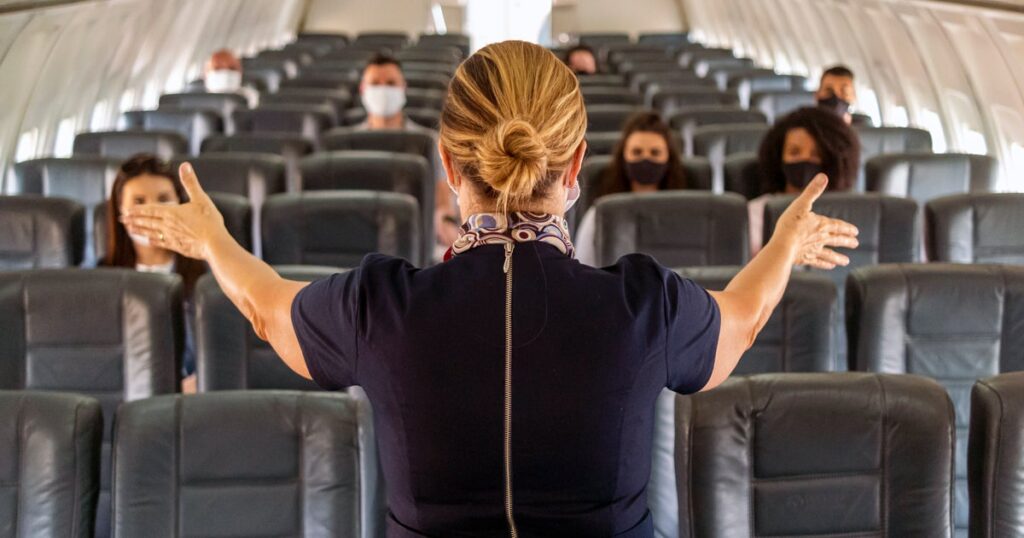At the end of May, Britney Spears made the news for some drama on a flight from Cabo San Lucas to Los Angeles — not only did she smoke on the flight (which is illegal) and admit to drinking vodka, but she also complained that a flight attendant ”put the seatbelt on me and invaded my space.”
That got us wondering — what exactly are flight attendants trained to do when they come across an unruly passenger? What can they do, and what can’t they do? To find out, we spoke with flight attendants about how they manage unruly passengers when up in the air (and on the ground) and what you can do to make your next flight better for everyone.
Before takeoff, flight attendants can remove a passenger from a plane.
If a flight is still on the ground, it’s a bit easier to handle an unruly passenger because they can be removed from the plane. We’ve all seen the videos of belligerent passengers being escorted off planes by law enforcement while still at the gate — it’s not fun, but it happens.
“It’s not up to us (the flight attendants) if we want to remove someone,” said Coraline C., a flight attendant who has been working on domestic flights for the past seven years and who asked to remain anonymous for privacy reasons. “We have to communicate with the captain as to what is going on and they make the final call. They generally take our input into their final decision, but it truly isn’t in our hands.”
Coraline said in her experience the unruly passengers that usually are removed are drunk people who are combative or unable to control themselves on the ground, but that’s not all.
“During COVID, people who refused to wear a mask were removed from planes and even today, people who refuse to get off their phones once the plane stops moving are escorted off,” Coraline said.
Being asked to get off a plane and board a different flight can also apply to families with children who are non-stop crying, throwing tantrums, etc. That said, families are usually given more leeway because it’s a fact of life that babies cry — but it can become problematic if it’s extremely disruptive to the rest of the passengers, especially for those longer-haul flights.
“A passenger can be removed from the plane and law enforcement can meet the flight,” said April S., a California-based flight attendant with a 21-year career in the field. “If you’re in the air, then it can get more complicated.”
wsfurlan via Getty Images
Flight attendants can try to verbally deescalate.
When a passenger is angry or not behaving properly after a flight has already taken off, the first thing flight attendants are trained to do is try to verbally deescalate the situation.
“I always try to validate their feelings (even if they aren’t valid in my eyes), and let them know I am listening (as most people honestly just want to be heard) and go from there,” said Coraline. “Often if it’s a situation where they may just dislike one crew member, we can send another flight attendant to speak to them to try and make a connection.”
During this process, they can try to ask questions to get to the underlying reason as to why a passenger may be so upset and go from there. “What happened? Have they been drinking alcohol? Have they taken any prescription drugs or illegal drugs? Mixed both?” the California-based flight attendant said.
Flight attendants can get a pilot involved.
If deescalation with flight attendants is unsuccessful, then they can choose to get the pilot involved in the situation.
“This generally results in someone (airline officials or police) meeting the plane upon arrival at the original destination, or if it gets bad enough, we will divert to the closest airport possible,” Coraline said.
Flight attendants can use self-defense.
The goal is to prevent passengers from becoming physical or violent, however, if it happens, flight attendants are taught self-defense techniques they can use to protect themselves and other passengers.
Flight attendants have to make do with the limited resources they have.
Flight attendants aren’t advised to make assumptions, threaten passengers or use physical force unless necessary, said Leesa L., a flight attendant for a major commercial airline who wishes to remain anonymous for privacy.
“We aren’t supposed to duct-tape passengers to the seat, that’s for sure, but we are extremely limited as to what we have, so we have to make do with what’s available at the time,” Coraline said. “The intent is to always keep things from getting physical and having to get anyone else involved.”
Here’s the bottom line.
At the end of the day, there will likely always be rule breakers and those who don’t listen to instructions whether on land or in the air — more specifically, those who believe they are above the law.
That said, it pays to listen to your flight attendants because if you don’t, then there could be consequences.
“Consequences can range from a slap on the wrist to an arrest, being fined by the FAA, and the inability to fly that airline said,” Leesa said.
At the end of the day, flight attendants’ main priority is the safety of everyone on board. “Every rule we ask you to follow is because having those rules could have saved lives or prevented accidents in the past,” the flight attendant told HuffPost.
Read the full article here








